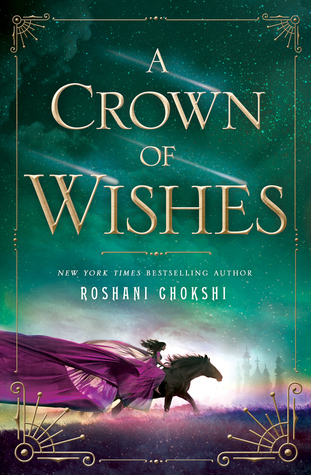I read the first chapter of A Crown of Wishes and immediately had to check twitter. Sure enough, Roshani Chokshi and Stephanie Garber, author of Caraval, follow each other. Did they also edit each others’ introductory chapters? Because both begin with a mysterious invitation to a mysterious game run by a dangerous and magical individual. Both set up competitors in this competition as a man and a woman with an absent sister. And both games are potentially deadly but offer a wish as the reward.

I don’t actually think there’s anything bad going on here, I just think it’s interesting that a theme of this year’s YA seems to be magical wishing games, just like last year there was a spate of fantasy westerns. Ah well. Surely fans of one of these books will find much to appreciate in the other, so don’t take this as an invitation to pit the books (or women) against each other. There’s room enough for two authors who are fond of a poetic turn of phrase and want to grant wishes.
There’s also the fact that Caraval is Garber’s first book, but Chokshi’s second. I can already see Chokshi’s skills have improved since her debut. Her evocative metaphors have sharpened, and her generally image-rich descriptions have been put to work in service of the story. Where before there were clunky lines that seemed like they were included because she liked the way they sounded too much to axe them, here things are cleaner (though without any sterility). We still get occasionally florid descriptions, and Chokshi’s a little too fond of describing things as “X and Y,” where the variables are nouns that don’t really go together However, the dialogue is excellent. Her characters also interact much more organically and with much more of a sense of fun, even though things are just as serious as in the last book. Mortal and immortal perils abound, but Vikram and Gauri are their equal, whether individually or (resentfully) together.

The couple that starts out hating each other is a well-worn trope, but that doesn’t make it any less successful here. Gauri and Vikram snipe delightfully at each other, and Gauri at one point genuinely tries to stab the Fox Prince and rob him down to his skivvies. I like that. There’s real commitment here, and both characters are genuinely pursuing their own ends to all logical extremes, up to and including extortion and murder and all kinds of other fun felonies. And they pull it off because they’re individuals first and companions second: in other words, they’re complete characters, not halves of a romantic whole. Vikram is clever but Gauri isn’t stupid; Gauri is a warrior but Vikram isn’t weak. It’s nice to see characters who aren’t one thing at the expense of the other.
Even though I have very little experience with Indian mythology, this story provides both the internal cohesion and the necessary explanations to make the narrative come together. Chokshi doesn’t over- or under-explain things, giving us the pleasure of learning but also leaving enough mystery to keep us guessing and intrigued. The directions the characters take and the resolutions they discover are also intuitively satisfying–a hard thing to quantify and to accomplish in a fantasy narrative, since it’s only after we see it that we understand whether it’s worked or not. Magic is tricky like that, but when it works it’s…well, magic.
Not everything makes perfect sense or comes together neatly–this isn’t a Brandon Sanderson novel–but it’s pretty clever and I was pleased to see how things turned out. Chokshi’s greatest success lies in her reflections on the nature of the game itself–how it would change the participants, and what the organizer could possibly want from them when he can grant wishes. Her philosophical musings–so often the downfall of fantasy books when they’re trite or clunky–are on point. I bookmarked page after page, wanting to return to her insights and phrasings.
Overall, Chokshi’s come a long way, and if this is any indication, her career will go further still. I’ll be pleased to put this on my shelf and excited to see what she comes up with next.
